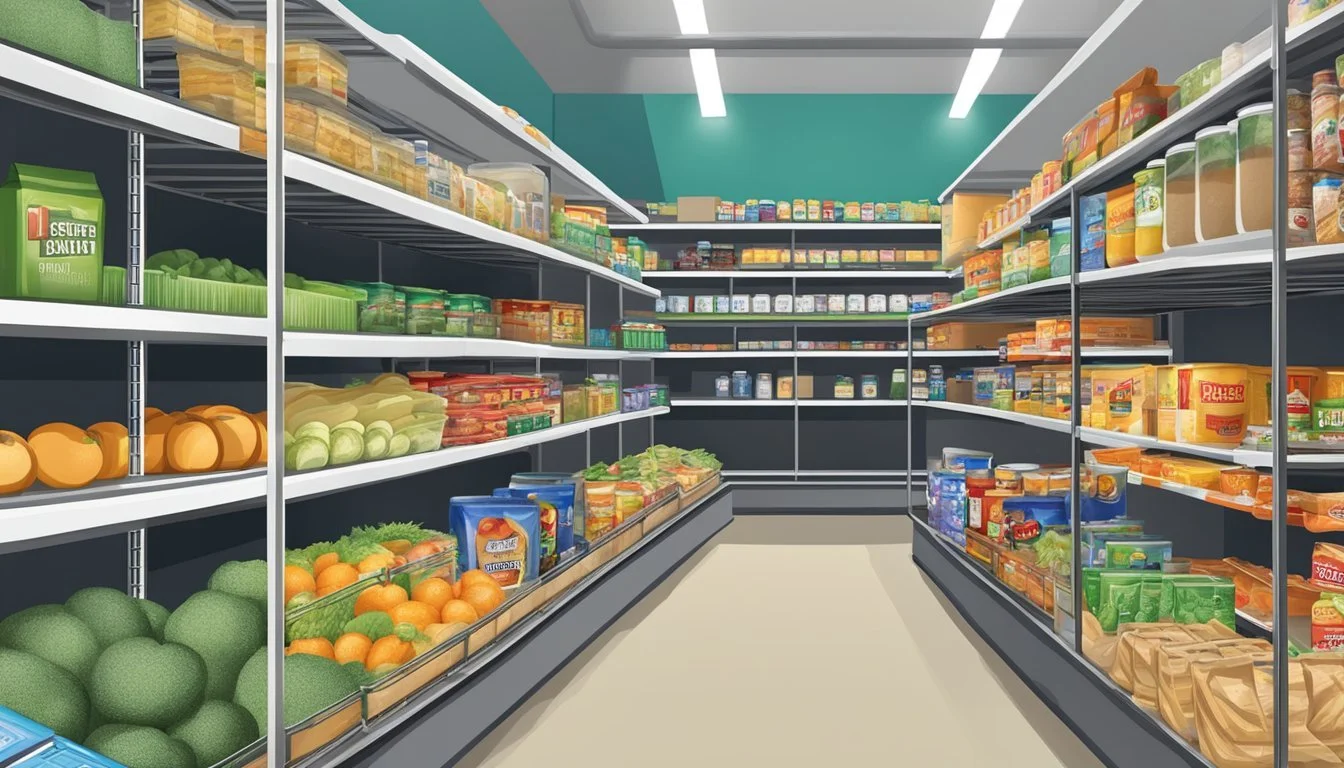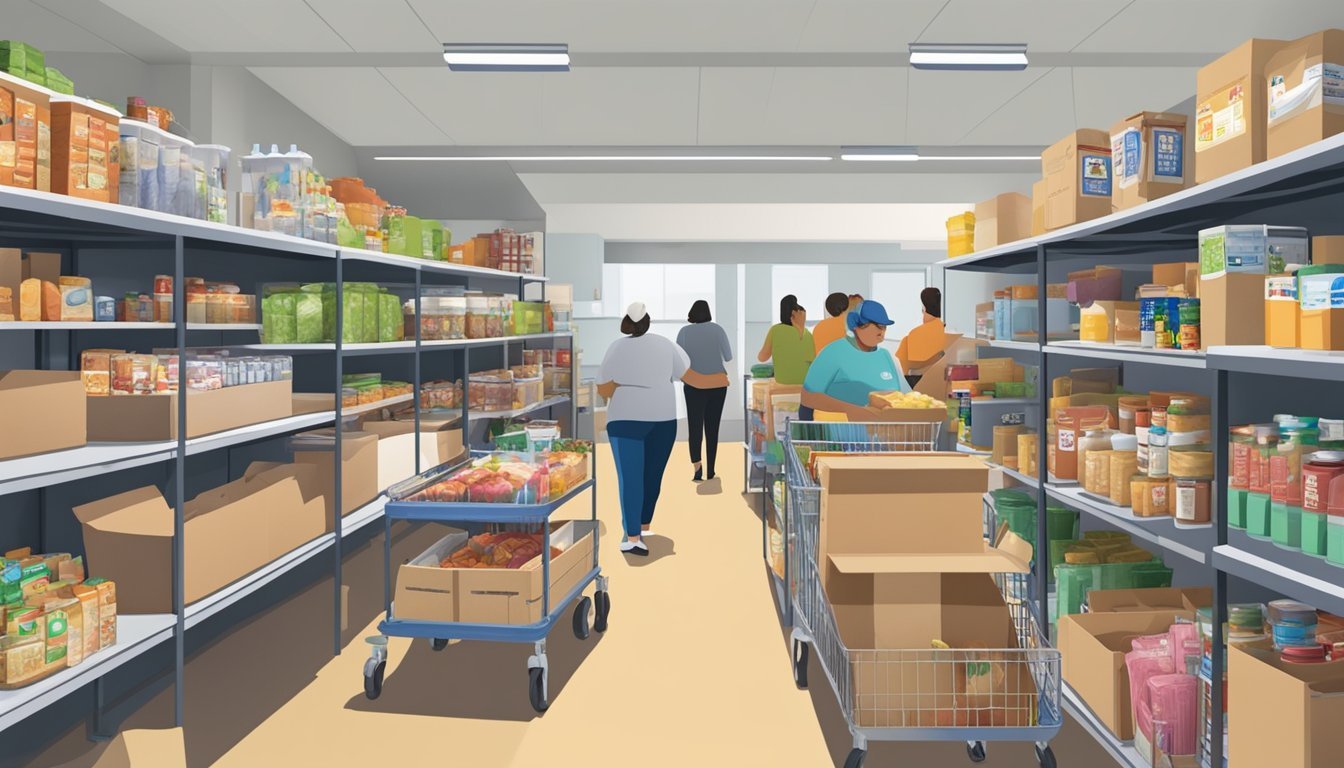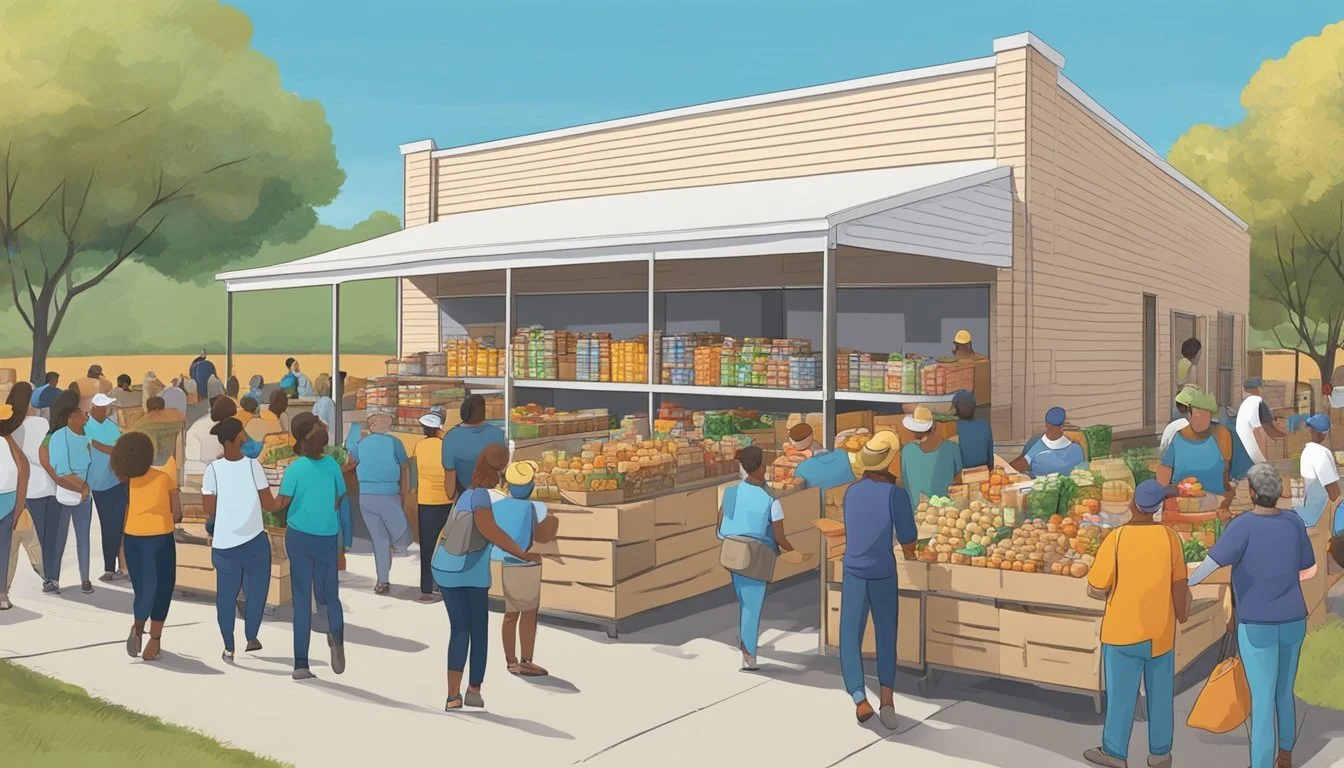Free Groceries and Food Pantries in Jackson County, Texas
A Comprehensive Guide
This Article is Part of Our Guide on Free Groceries in Texas
Access to nutritious food is a fundamental need, and in Jackson County, Texas, various programs and initiatives are dedicated to ensuring that individuals and families facing food insecurity can obtain free groceries and sustenance. Food pantries and distribution efforts, often coordinated by community organizations and non-profits, play a pivotal role in these support systems. They provide not only essential food items to those in need but also a sense of community and support in challenging times.
In Jackson County, the FBGC Mobile Pantry Distribution, conveniently located at City Park, offers monthly assistance on the last Friday of each month. This initiative is a testament to the community’s dedication to fighting hunger and providing support to residents. With local food banks often forming alliances with larger networks such as Feeding America, they are able to secure a diverse range of fresh and shelf-stable food items that meet the nutritional needs of a broad spectrum of the population.
Residents of Jackson County who find themselves in need of food assistance have these valuable resources available to them. Food banks and pantries in the area understand the importance of easy access to food assistance, and many have adapted to offer options such as drive-thru pantries to simplify the process of acquiring food and groceries. These services are designed to uphold the dignity of people seeking help, while ensuring that no one in the community goes hungry.
Understanding Food Insecurity
Food insecurity is a pressing issue in Jackson County, Texas, where access to nutritious food is not a given for all residents. Local food banks, government assistance programs, and community efforts play crucial roles in addressing this challenge.
The Role of Food Banks
Food banks are pivotal in the distribution of free groceries to those facing food insecurity. They serve as centralized hubs that collect, store, and redistribute donated food to a network of community agencies, including food pantries and soup kitchens. Feeding America is a significant entity in this system, offering resources and support to amplify the reach of local food banks.
SNAP and WIC Programs
SNAP (Supplemental Nutrition Assistance Program) and WIC (Women, Infants, and Children) are critical government-funded resources that provide nutritional assistance to eligible individuals and families. SNAP benefits can be used to purchase food items at various retailers, while WIC focuses on the nutritional needs of pregnant, breastfeeding women, and young children, providing access to essential foods and infant formula.
SNAP Eligibility: Generally, it is determined by income and household size.
WIC Benefits: Include specific food such as milk, whole grains, and fruits.
Impact of Food Assistance on Communities
The collective impact of food assistance programs is substantial, helping alleviate the daily stress and health implications associated with food scarcity. Assistance from food banks, combined with SNAP and WIC, contributes to the stability and well-being of communities, ensuring that vulnerable populations receive critical sustenance.
Locating Food Pantries and Banks
Residents of Jackson County, Texas, in need of food assistance have several resources available. This section provides information about local and regional food banks, pantry locations, and special programs that offer food aid to those in need.
Food Bank of the Golden Crescent
The Food Bank of the Golden Crescent serves as a central hub for food distribution in the area. It supports a variety of counties including Calhoun, Colorado, DeWitt, Goliad, Gonzales, Jackson, Lavaca, Matagorda, Refugio, and Wharton. Those seeking assistance can find various food programs tailored to their needs within this network.
Jackson County Pantry Locations
Several food pantries operate within Jackson County, offering access to free groceries. Locations may vary, and it's important to confirm their hours of operation and any potential zip code restrictions. Residents can find specific locations and services offered by contacting local entities such as the Salvation Army or visiting websites of regional food assistance organizations.
Regional Food Banks
Apart from local pantries, Jackson County is supported by larger regional food banks that extend their services to multiple counties in Texas. This includes the San Antonio Food Bank, the Central Texas Food Bank in Austin, the Houston Food Bank, the Tarrant Area Food Bank in Fort Worth, and the North Texas Food Bank in Dallas. These banks provide a more extensive network of food assistance covering a wider area.
Holiday Meals and Special Programs
Special programs, often run by entities like the Salvation Army and Meals on Wheels, offer holiday meals (What wine goes well with holiday meals?) and additional food services during certain times of the year. These programs are designed to ensure that every individual and family has access to nutritious meals, particularly during the holiday season and in times of crisis.
How to Access Free Groceries
Accessing free groceries in Jackson County, Texas, is possible through various programs designed to assist those with low income or who are unemployed. These programs have specific eligibility requirements and offer different methods of distribution to accommodate residents' needs.
Eligibility and Application Process
Eligibility for free groceries often depends on income levels and employment status. Individuals and families can apply for SNAP benefits by providing proof of income and personal identification. Applications are available through local SNAP offices or online. In addition, many local food assistance programs require individuals to present an address within the serving area, which can include cities like Abilene, Amarillo, Andrews, Austin, and Corpus Christi.
Drive-Thru and Mobile Pantries
Drive-thru and mobile pantries provide a convenient way to receive food without leaving one's vehicle, thus supporting social distancing measures. Residents of Jackson County can locate their nearest drive-thru pantry by contacting local food banks and providing their zip code. Information on mobile pantry schedules and locations can typically be obtained through a quick call or visit to the organization’s website.
Soup Kitchens and Hot Meals
Soup kitchens and hot meals are available to those in need of immediate food assistance. They usually do not require proof of income and can be accessed by visiting the facility. The address and contact information for these services can be found on local non-profit or community organization websites, or by inquiring at local food banks. These resources are especially important for those who require ready-to-eat meals, including the elderly or individuals without cooking facilities.
Available Food Items
In Jackson County, food assistance programs provide a range of food items catering to various dietary needs. They ensure that individuals and families have access to essential grocery items, from fresh produce to non-perishable goods.
Produce and Perishables
Food pantries in Jackson County prioritize the distribution of fresh produce including fruits and vegetables, ensuring recipients have access to nutrients essential for a balanced diet. Perishables such as meat and dairy products are also available, often sourced to support local dietary habits and nutritional requirements.
Canned Goods and Non-perishables
Shelves at local pantries are stocked with a variety of canned goods, encompassing everything from vegetables and fruits to soups and meats. These non-perishable items provide stable food options that are crucial during times when fresh food cannot be obtained or stored long-term.
Healthy Food Options
With a focus on health, food assistance programs in the county offer healthy options specifically designed to meet the dietary needs of all age groups. This includes low-sodium canned goods, sugar-free items for those with dietary restrictions, and high-fiber foods to support digestive health. They ensure that the options available contribute to a holistic, balanced diet.
Additional Resources and Services
Jackson County not only provides access to food pantries but also extends additional resources and services tailored to meet diverse community needs. These resources complement the vital food assistance programs with broader support, from clothing provision to educational support.
Clothing and Household Items
Many non-profit organizations and charities, including the Salvation Army and local churches, offer clothing and essential household items to individuals and families in need. Good Samaritan and other similar entities often have thrift stores or donation centers specifically designed to assist those in the community, distributing items such as clothing, bedding, and kitchenware.
Specialized Programs for Families
Families with specific needs can find help through programs that offer diapers, baby formula, and children's clothing. Some pantries, like Harvest House, go beyond food assistance and provide these critical supplies to ensure that the needs of the youngest members of the family are also met. These programs are often tailored to relieve the financial burdens on families caring for young children.
Educational Workshops and Support
To empower individuals and foster self-sufficiency, many non-profits conduct educational workshops. These programs may range from nutrition classes to budgeting and financial management to support overall well-being. Informational support services are often available through various channels including church-led initiatives or community groups, focusing on equipping participants with the knowledge and skills necessary to improve their life circumstances.
Community Support and Volunteering
Jackson County, Texas, is a community enriched by the spirit of volunteerism, especially when addressing food insecurity through local food banks and pantries. Community members can actively contribute to these efforts in varied roles from hands-on assistance to monetary support.
How to Volunteer at Food Banks
Volunteering at local food banks like the Central Texas Food Bank, Tarrant Area Food Bank, North Texas Food Bank, and High Plains Food Bank, requires a simple process of application. Prospective volunteers can typically sign up through the organizations' websites, where they can:
Choose shifts that fit their schedule.
Receive training for various tasks.
Undertake roles such as sorting donations, packing food boxes, and assisting in distribution.
Local food bank websites provide full details on how to get involved, eligibility criteria, and opportunities available for individuals and groups.
Community Driven Food Drives
Food drives are community events that collect donations of non-perishable food items for those in need. Organizations, schools, and businesses can host these drives with support from food banks. Here's a structured approach to organize a food drive:
Plan: Determine the time frame and location of the food drive.
Partner: Connect with local food banks to understand their current needs.
Promote: Use social media and local advertising to inform the community.
Proceed: Collect, sort, and deliver donations to the chosen food bank.
Financial Donations and Sponsorships
Beyond donating time and food, financial contributions play a crucial role in sustaining the operations of food banks. Monetary donations can often be matched by corporate sponsors, multiplying their impact. Community members and businesses can contribute by:
Making a one-time or recurring donation.
Sponsoring events and programs that benefit the food bank.
Engaging in fundraiser activities.
Each local food bank offers simple online donation options, and many have lists of specific programs or initiatives that benefactors can choose to support directly.
Understanding Government Food Programs
In Jackson County, Texas, individuals and families with low incomes can access various government food programs aimed at reducing hunger and providing nutritious food to those in need. These programs include SNAP Food Stamps and WIC, each with specific benefits.
SNAP Food Stamps
SNAP, the Supplemental Nutrition Assistance Program, often referred to as food stamps, provides eligible individuals and families with an Electronic Benefits Transfer (EBT) card. This card can be used like a debit card to purchase groceries at authorized retailers. SNAP benefits are determined by the household size, income, and certain expenses, and they are intended to supplement the family's food budget to ensure they can purchase healthy food.
WIC Assistance and Benefits
The Special Supplemental Nutrition Program for Women, Infants, and Children, commonly known as WIC, is a program specifically targeting the nutritional needs of pregnant, postpartum and breastfeeding women, infants, and children up to the age of five. WIC provides nutritious foods, education on healthy eating, and referrals to healthcare. The WIC benefits include vouchers or EBT cards that can be used to buy specific food items rich in nutrients essential for growth and development.
Food Stamps vs. Food Banks
While food stamps refer to the SNAP program providing financial assistance to purchase food, food banks are nonprofit organizations that distribute food directly to individuals in need. Food banks often rely on donations and may provide a variety of fresh and non-perishable items to individuals and families without requiring payment. They serve as an essential complement to federal assistance programs, filling in gaps for households that may still experience food insecurity despite receiving government benefits.









